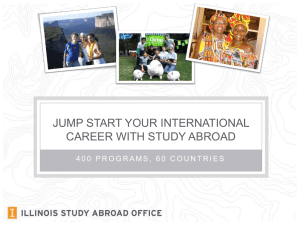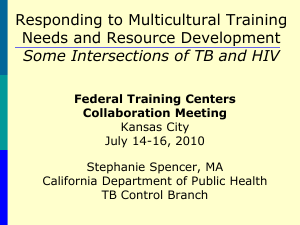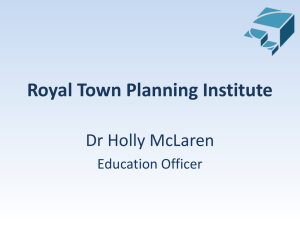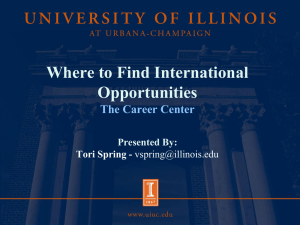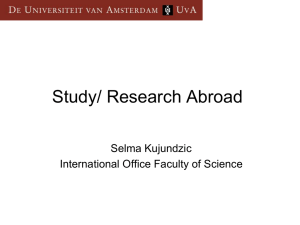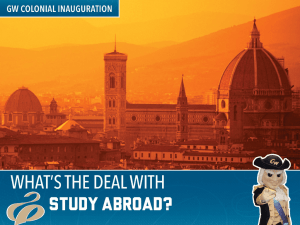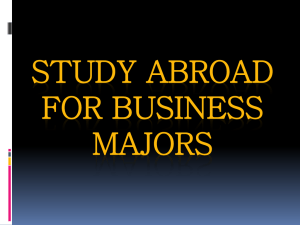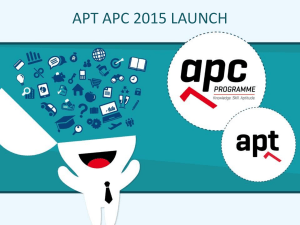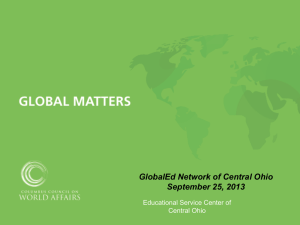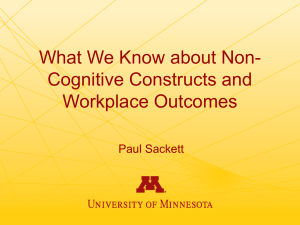In Pursuit of Global Competence: Features Which Indicate Effective
advertisement
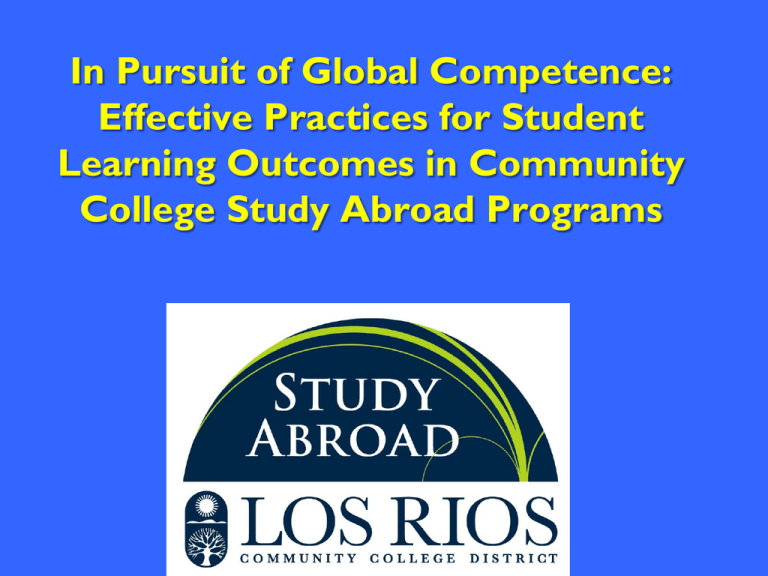
In Pursuit of Global Competence: Effective Practices for Student Learning Outcomes in Community College Study Abroad Programs What nations don’t know can hurt them. The stakes involved in study abroad are that simple, that straightforward, and that important. For their own future and that of the nation, college graduates today must be internationally competent. ABRAHAM LINCOLN COMMISSION ON STUDY ABROAD, 2005 Background Information Senate Resolution 308 ATS, 2005 There is a “serious deficit in global competence in the United States,” and “institutions of higher education in the United States are struggling to graduate enough students with the language skills and cultural competence necessary to meet the current demands of business, government, and educational institutions” Rationale for Community College Study Abroad Programs There is a clear need to build global competence in college students Community colleges have 45-55% of all undergraduates but only 3% of students studying abroad annually There exists a community college research gap on study abroad programs, structures, and their relation to global competence acquisition. Research Background Elements of Global Competence Examined broader understanding of global competence Examined global competence elements Developed conceptual framework for global competence Proposed global competence definition Global Competence: Knowledge Effective intercultural communication skills including language skills Ability to function as a member of another culture Appreciation of own and others’ personal and cultural norms Global Competence: Elements and Characteristics Critical awareness & appreciation of cultural differences Appreciation of and openness to global interdependence Knowledge Knowledge of of geo-political Knowledge world history issues, changes, of global and current and decision business events making interactions and organizations Knowledge Elements Identified in Research Global Competence: Skills and Experiences Appreciation Effective of own and others’ personal intercultural and Critical cultural norms communication awareness & appreciation skills including of cultural differences language skills Global Ability to Appreciation of and Competence: function as a openness to global Elements and interdependence member of Characteristics another culture Knowledge of world history and current events Knowledge of global business interactions and organizations Knowledge of geo-political issues, changes, and decision making Skill and Experience Elements Identified in Research Global Competence: Attitudes Appreciation of own and others’ personal Critical awareness and cultural Effective & norms intercultural communication appreciation skills including of cultural language skills Global differences Ability to function as a member of another culture Knowledge of world history and current events Competence: Appreciation of Elements and openness to global Characteristics interdependence Knowledge of global business interactions and organizations Knowledge of geo-political issues, changes, and decision making Attitude Elements Identified in Research . Global Competence Elements and Characteristics Effective intercultural communication skills including language skills Ability to function as a member of another culture Knowledge of world history and current events Appreciation of own and others’ personal and cultural norms Global Competence: Elements and Characteristics Knowledge of global business interactions and organizations Critical awareness & appreciation of cultural differences Appreciation of and openness to global interdependence Knowledge of geo-political issues, changes, and decision making Specific skills, abilities, and experiences that relate to and operationalize global competence elements Global Competence –Definition Used in Student Learning Outcomes Global competence is a continuing process of acquiring specific economic, historical, and geo-political knowledge which supports the intercultural communication skills and authentic lived experiences that allow a person to function in another culture, and result in attitudes of cultural appreciation and interdependence. Study Abroad Program Structure Academic Program Program Length Program Location Faculty Selection Curriculum Selection Cultural Experiences Academic (study abroad) Residential (living abroad) Residential Program Type and level of student services Housing options Cultural activities Los Rios Study Abroad Program Student Learning Outcomes • • • • • • Global Competence Personal Growth Continued Interest in Travel Knowledge Acquisition Development of Skills and Experiences Attitude Enhancement and Change Los Rios Study Abroad Program Student Learning Outcomes 1. Global Competence -- As a result of participating in the Study Abroad program, the student will be able to contextually appreciate, analyze, and articulate global competence. Los Rios Study Abroad Program Student Learning Outcomes 2.Personal Growth -- The student will be able to successfully live and thrive in a culture not the student’s own and grow individually and personally from the experience. Los Rios Study Abroad Program Student Learning Outcomes 3. Continued Interest in Travel -- The student will incorporate an interest in international travel into the student’s lifelong learning plan. Los Rios Study Abroad Program Student Learning Outcomes 4. Knowledge Acquisition -- The student will incorporate specific cultural, geopolitical, economic, and social knowledge into academic and personal contexts. Los Rios Study Abroad Program Student Learning Outcomes 5. Development of Skills and Experiences -- The student will develop skills to appreciate visual, historical and experiential cultural products of cultures different from the student’s own. Los Rios Study Abroad Program Student Learning Outcomes 6. Attitude Enhancement and Change -As one consequence of participating in the Study Abroad program, the student will question, analyze, and potentially change attitudes about the host culture that the student had prior to the experience, and this attitudinal analysis will result in less ethnocentric behavior. “We need a group of academic leaders to challenge us, to make us dream, to lead us to sacrifice a little for the long term benefit of our nation and our world.” Senator Paul Simon
